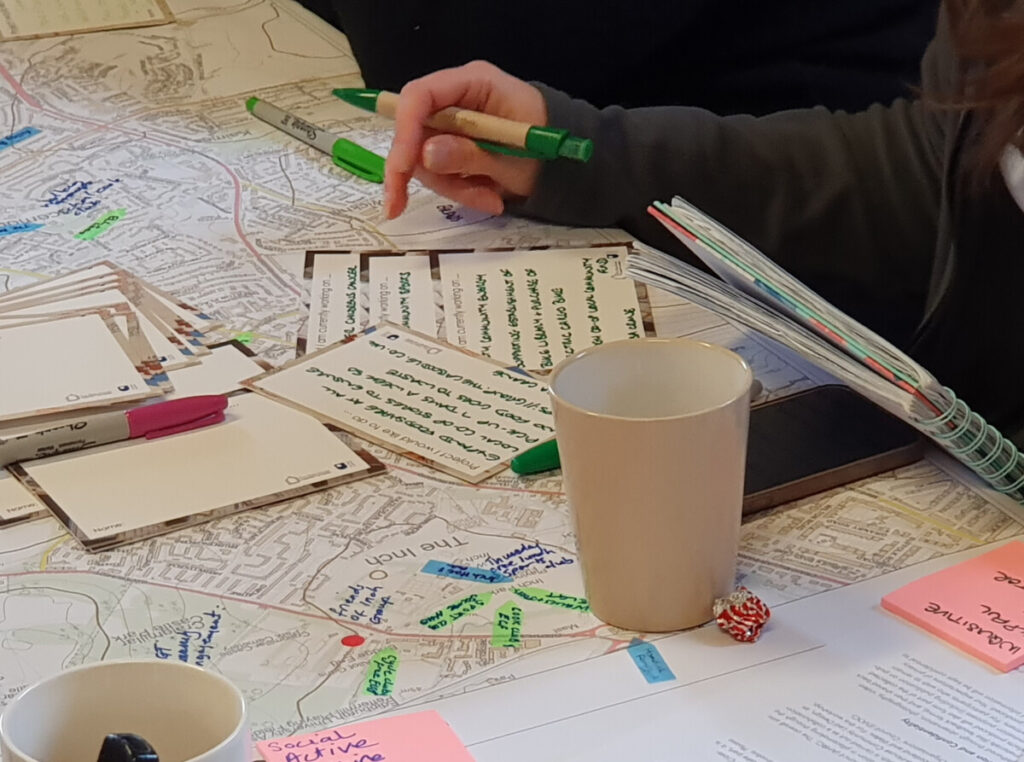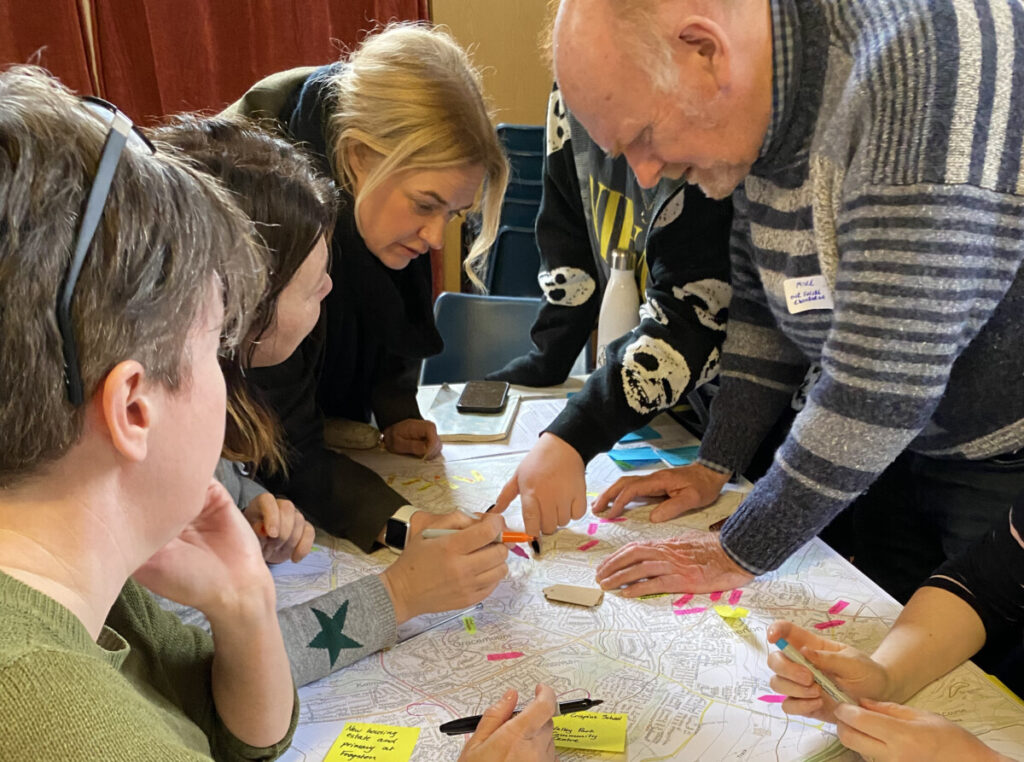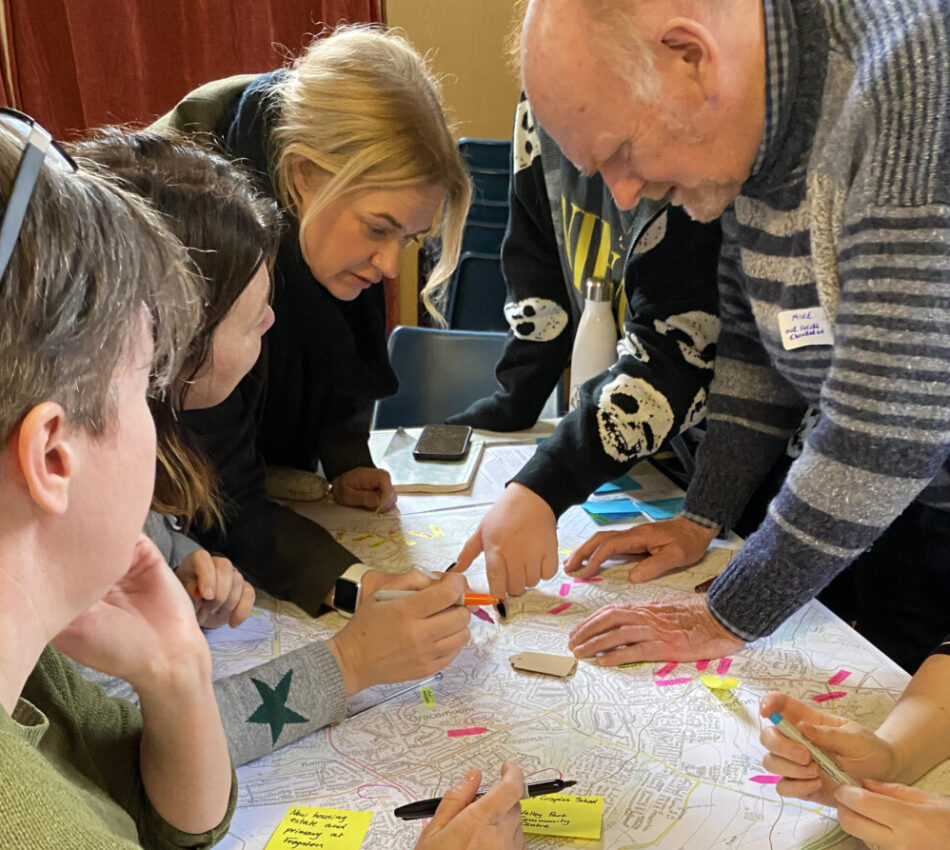Written by:
On 9 October, we took part in the Arts & Humanities Research Council (AHRC) Policy Brief session, Cross-sector Collaboration and Co-design, which shared our findings and recommendations from our recent research project, Cross-pollination: Growing cross-sector design collaboration in placemaking in collaboration with The Open University and 13 local partners in England, Scotland and Wales, which saw us working with over 50 organisations and 450 individuals. This session was part of a series of policy briefing sessions organised by the AHRC Place-Based Research Programme, sharing findings from the programme’s innovative arts and humanities research in all four nations of the United Kingdom. The session was hosted and chaired by the AHRC Place Programme’s Rebecca Magdin and Michael Howcroft, and invited our “respondents”, Jessie Johnson, Head of Knowledge at Design Council and Claire Robinson, Partnerships Director at Chichester Community Development Trust, to briefly share their thoughts/reactions on our brief, followed by an open discussion with those attending.
Our research, and this session, began with the conviction that tackling social and regional inequalities and injustices requires diverse sectors to work together to co-design and co-produce place-based projects or initiatives. Through the 15-month research project, we explored the notion of integrative leadership. This is a form of place-based leadership that emerges from cross-sector collaboration, harnessing the creativity, interests and capacity of different actors rooted in a place (community groups, social enterprises, voluntary sector organisations, public bodies, universities, local media, businesses, and local governments).
We explored integrative leadership through experimenting with cross-pollination, a creative design-led approach that brings representatives from different groups, organisations and sectors together to establish a ‘collaborative economy’ of assets (e.g. skills, networks, funds) and develop actions to enhance existing initiatives or co-design new ones. We wanted to test it in different contexts as a means of instigating and growing cross-sector design collaboration to create more inclusive, democratic and sustainable places and place-based services.

Thanks to the generosity of the many people, organisations and communities we worked with through this project, we learned a huge amount about the conditions for integrative leadership, which we shared in this briefing session. You can read the full policy brief, Enabling integrative leadership and cross-sector design collaboration: insights from the Cross-pollination project here. This summarises our key findings, both around the outcomes of the cross-pollination approach and the conditions for integrative leadership, as well as our recommendations to policy makers, local authorities, practitioners and funders.
I would like to reflect on just a few of key points of particular interest with our respondents, and in the discussion that followed at this policy briefing session.
Create Safe Spaces for Connection and Experimentation
One of the key findings of our research was that in order to foster collaboration and integrative leadership it is essential to create safe, welcoming spaces to bring together diverse people and organisations within a place. We found that this was particularly effective when these activities were hosted by trusted organisations with deep roots in the community, and that such organisations are well placed to convene local conversations.
Our respondent Jessie Johnson of Design Council felt this really chimed with her experience of leading programmes within the Design Council’s Framework for Innovation, which has been applied with partners across the private, public and third sectors. She stressed that in her experience, a physical space can be hugely important, and can help people step into a different world, a space where they are away from their everyday environments, be curious, challenge assumptions, and find different ways to work together.
Chichester Community Development Trust, with which we collaborated on cross-pollination activities after the research project, is a prime example of such an organisation rooted in their local community, with strong networks and connections locally. It was therefore interesting to hear Claire Robinson’s reflection on this recommendation, and of CCDT’s experience both as a participant of a cross-pollination workshop facilitated by our research team, and then a second workshop which they subsequently convened and facilitated on their own. She stressed the significance of just creating that opportunity for people to come together, learn about what others are doing and to find shared interests and objectives. She stressed that as much as the physical space to do this, it is important to create the time for it, and to ensure that the conversation feels open, without fixed agendas.
Take Time to Map Together

Both Claire and Jesse spoke of the value of bringing people and organisations together to share information about projects they are doing, would like to do, and what they might contribute to each other’s initiatives through collaboration. Interestingly, they also stressed that people doing this mapping together added to its value, and that through talking to each other and making personal connections, the outcomes could be far more impactful than an individual simply sitting down and producing a list to share with others.
This was certainly our experience throughout the project, with this observation being made again and again at the cross-pollination workshops we helped facilitate. People commented on having identified key people and organisations within their community as “connectors” but also on their surprise at just how much was going on within their communities that they hadn’t known about, and the opportunities for collaboration they had found within such a short space of time at the workshop. Claire spoke of the 40+stakeholders who had attended cross-pollination workshops at their community facility within Graylingwell Chapel, many of whom are continuing to speak to each other and collaborate after the workshop.
Nurture Cross-pollination Champions
Our research team, respondents and various participants in the session stressed the importance of the facilitation of these activities. Our recommendation to nurture cross-pollination champions and enablers through both training and support seemed to gain considerable traction with those attending. They noted that there is a skills gap in this area, and that it was essential that we train more people to use co-design and co-production techniques. While some suggested these co-design champions should come from design professions, our research team made the point that with the right training and support, this sort of co-design activity could also easily be facilitated by members of the community, local authority officers, academics, anyons with the skills, confidence and tools to enable people working together.
Jesse noted in her response that trusted local organisations, which already have a strong network of relationships, often have people within their team who are well placed to lead such activities. Many of the individuals and groups we had worked with through the project demonstrated this, as did the success of CCDT taking up the approach and making it their own to suit their organisation and local community.
The Conversation Continues
We’d like to thank all of those who participated in our policy briefing session, as well as our wonderful collaborators in the cross-pollination project, who so generously shared their time, energy and learning with us. There is a lot more we plan to do in this space, and we would invite anyone with an interest in collaborating with us to drop us a line.


